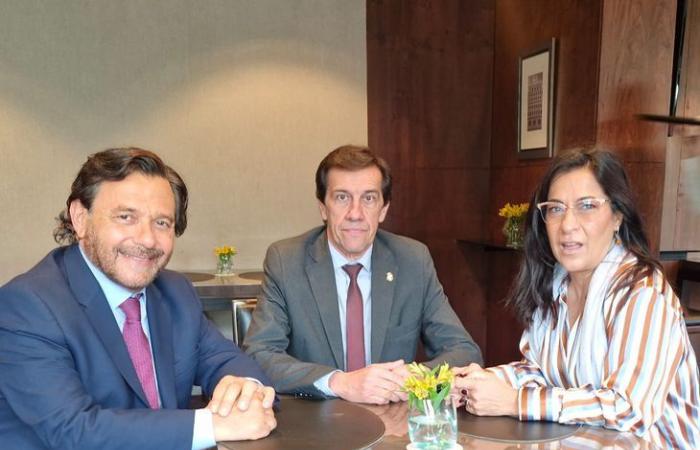Carolina Moisés: I voted against out of conviction. It is a complex law, very mixed, that incorporated harmful things into the national system. We, the 33 senators of the Union for the Homeland bloc, seeking rejection. We made every effort to get four more votes. Until the session began and then we already knew it was complex. Until the end of the session, in a long process of several stages, we achieved a series of changes: it was removed from the list of companies to be privatized Correo Argentino, Airlines, public media. Another point was to ensure that organizations that the Government wants to dissolve but that we consider strategic could not be eliminated: INTA, Meteorological Service, Conicet, organizations dedicated to cultural policies. Another strong issue: we managed to get the pension chapter published. It was very serious, because it proposed raising the retirement age to 65 for women to eliminating the moratorium; It affects retired men and women. We were concerned about that, among other things, and changes were achieved thanks to the fact that the 33 senators remained united and that the dialogueists, in quotes (sic), knew how to set the conditions for these changes. In parliamentary debate it is never all or nothing, black or white, because in that case dialogue and consensus would be impossible. Given the numerical weakness of the ruling party, we were able to have a game without giving in to our convictions. It is a bad law, but it is a better law with the changes.
Q: And regarding the RIGI, why do I vote in favor?
CM: With the senators Guillermo Andrada of Catamarca and Sandra Mendoza of Tucumán of UPwho also voted in favor on that point, we have been working with the governors of the NOA, in the evaluation of the impact of the RIGI in the region. The affirmative vote is based on the decision in the North’s strategic position, which requires large investments to solve the labor problem. The lack of work in the north is real and the work is poorly paid. Blank, 47% of Jujuy’s workers earn less than a basic basket, either receive minimal social service benefits or are informal. We have to have that as a priority. How we solve the problem of work.
Q: Does RIGI help solve it?
CM: To generate a thousand jobs in Jujuy we need big investments. If we do not generate incentives, we will not achieve it. Another fact: In Jujuy, 60% of people believe that lithium is an advantage, and the kids want to work in a mining or technology company in the future. I know my province, and we want to give them tools to have a dignified life. Of course, RIGI is not magic, it is not going to happen overnight, but it is a way of offering possibilities for them to come and invest, so that we have large-scale ventures. I am from a town, Saint PeterThere is a mill there that employs 1,100 people. That’s a multiplier: transportation and local services. There are also two lithium mining ventures, which require intensive labor in the construction work, and then descend to qualified labor. They are guidelines for large investments to arrive. The RIGI seen from the Pampas area is not the same as from the Puna of Jujuy.. Or from Salta or Catamarca. The possibilities of generating work in the NOA are limited.
WhatsApp Image 2024-06-14 at 16.36.34.jpeg
Senator Carolina Moisés with governors Gustavo Sáenz (Salta) and Carlos Sadir (Jujuy).
Q: You mention lithium as an opportunity, can added value be generated?
CM: Yes, and Conicet is essential. They created an interesting model for the construction of battery cells, which are developments of inputs to make the battery. They produce 10 cells per day. If US$200 million came, which is the floor of the RIGI, from a company that dares to do this, there are 300 qualified job positions. We need universities that train. Zapla, a steel complex in Palpalá, is producing at 10 or 20 percent: they have no investment. If an investment were to arrive, Palpalá will generate work immediately. The RIGI for the north is an opportunity. It is reductionism to say that if the RIGI is voted, we will hand over the country.
Q: From within Unión por la Patria they say that?
CM: Sectors of Peronism that seek to keep us anchored to the past. They come with a dogmatic discourse of homeland or colony. But that debate is old, it doesn’t exist, it doesn’t convince anyone. We are in the third technological revolution. We have to be able to address the problems of the world, which are the problems of Argentines. Homeland or colony does not respond to anyone. We want a modern Peronism, which has a position on Artificial Intelligence, on new technologies, producing them. It is good that in Kirchnerism we have been able to build satellites… but there it is not a homeland or a colony. Vaca Muerta is a great undertaking… there is no problem negotiating with foreign investors there either. Homeland or colony is for the tribune. They don’t take me to that debate. Let’s go to a debate on how we build an avant-garde proposal for the future, revolutionary for the future, not seventies. Let’s start talking about new rights. There is a generational debate. “Peronism was very good because my grandfather…” they tell us. It was very good in the past, but it has to be the key to how we build the Peronism of the future. There is a Kirchnerist reductionism that seeks to allow all Peronism to enter, and anyone who does not enter is a traitor. In it Senate There was unity among the 33 senators, supporting changes and voting against them in general and each of their articles. But when it comes to strategic development of the NOAthat’s where my representation with my province begins.
Q: You mentioned dialogue with the governor, who is radical in his province (Carlos Sadir). What is that link like?
CM: With the governor we have to think about these things together. We have differences in internal politics in Jujuy. In his government, I represent the opposition. As a national senator, I am a senator from Jujeños. Beyond the parties, there is dialogue with the governor for overriding issues, such as lithium and mining. There are changes in the RIGI that will be complied with provincial legislation. There was support from Sadir for the change. They were supported by the governors of Salta, Catamarca and Tucumán also. We proposed that 20% investment in the construction stage should be local. The Government explained poorly: it is not US$200 million of impact, that is a multiplier in the region, because in the construction stage transportation, connectivity, and local supply are needed. Generate a value chain for that project. It must be recognized that there was a capacity for dialogue, an active listening by the Government. The first stage of a mining project is intensive, usually local. The second stage, exploitation, is qualified. The provinces do not have that offer, it must be built from the university. So, we must give predictability to kids, not companies.
Q: There are discussions about whether Deputies can insist on points of discussion that were rejected in the Senate, such as Profits or Personal Assets. What do you think?
CM: Deputies did a poor job with this Base Law, they sent us a mess. We fixed as much as possible. Out of respect for the work of the Senate Chamber, you must accept it outright as it came out. Regarding the legal question, there is always a half of the library for each position.






